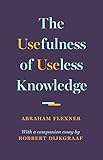The usefulness of useless knowledge / Abraham Flexner ; with a companion essay by Robbert Dijkgraaf.
By: Flexner, Abraham [author.] .
.
Contributor(s): Dijkgraaf, R [author.] .
.
Material type:  BookPublisher: Princeton, New Jersey : Princeton University Press, [2017]Copyright date: �2017Description: 1 online resource.Content type: text Media type: computer Carrier type: online resourceISBN: 9781400884629; 1400884624.Subject(s): Research
BookPublisher: Princeton, New Jersey : Princeton University Press, [2017]Copyright date: �2017Description: 1 online resource.Content type: text Media type: computer Carrier type: online resourceISBN: 9781400884629; 1400884624.Subject(s): ResearchOnline resource; title from PDF title page (EBSCO, viewed February 28, 2017).
Includes bibliographical references.
The world of tomorrow / Robbert Dijkgraaf -- The usefulness of useless knowledge / Abraham Flexner.
A forty-year tightening of funding for scientific research has meant that resources are increasingly directed toward applied or practical outcomes, with the intent of creating products of immediate value. In such a scenario, it makes sense to focus on the most identifiable and urgent problems, right? Actually, it doesn't. In his classic essay "The Usefulness of Useless Knowledge," Abraham Flexner, the founding director of the Institute for Advanced Study in Princeton and the man who helped bring Albert Einstein to the United States, describes a great paradox of scientific research. The search for answers to deep questions, motivated solely by curiosity and without concern for applications, often leads not only to the greatest scientific discoveries but also to the most revolutionary technological breakthroughs. In short, no quantum mechanics, no computer chips. This brief book includes Flexner's timeless 1939 essay alongside a new companion essay by Robbert Dijkgraaf, the Institute's current director, in which he shows that Flexner's defense of the value of "the unobstructed pursuit of useless knowledge" may be even more relevant today than it was in the early twentieth century. Dijkgraaf describes how basic research has led to major transformations in the past century and explains why it is an essential precondition of innovation and the first step in social and cultural change.
In English.
IEEE IEEE Xplore Princeton University Press eBooks Library


There are no comments for this item.